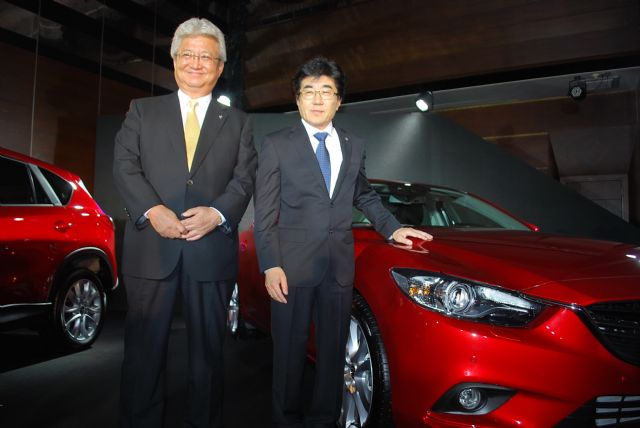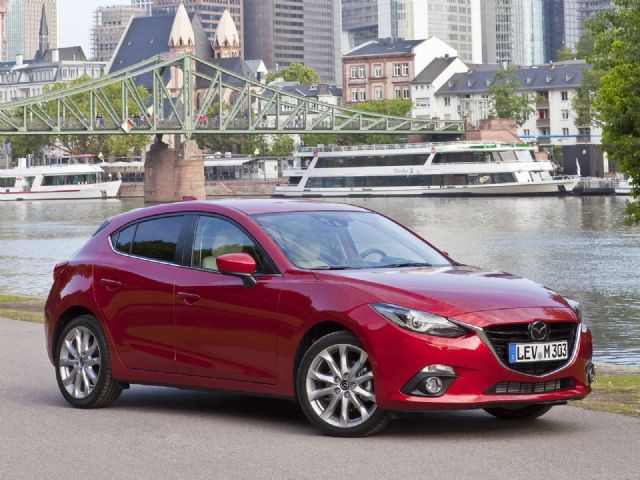Mazda Opens New Subsidiary in Taiwan, Aims for 5% Share by 2018
2014/07/28 | By Quincy Liang
Japanese automaker Mazda Motor Corp. recently announced the launch of a newly-established auto sales company in Taiwan, Mazda Motor Taiwan (MMT), a 100%-owned subsidiary. MMT will plan and implement branding and sales strategies aimed at increasing sales in Taiwan, Mazda's Japanese headquarters said.
MMT will soon take back its local agent rights. At the press conference to announce the establishment of the Taiwanese subsidiary, Nobuhide Inamoto, Mazda's director and senior managing executive officer overseeing operations in China and Taiwan, said that MMT is scheduled to launch five brand-new car models in Taiwan over next two years, aiming to boost its market share on the island to 5% by 2018. Mazda's market share in Taiwan once climbed to a record high of 7% a few years ago, making it one of the top-five auto brands on the island. In recent years, the firm's sales have been roughly flat.
Mazda began selling vehicles in Taiwan in 1959. Since 1998 all sales-related activities including sales and customer services have been carried out through its affiliate, Ford Distribution Taiwan Ltd. (FDTL). Mazda has enjoyed strong sales in Taiwan, especially models with the company's SKYACTIV technology, such as the Mazda CX-5 and Mazda6 (known as Atenza in Japan). Sales in Taiwan in the fiscal year that ended March 2014 were up about 18% over previous year.

MMT will take over FDTL's sales network and assume control of all sales-related activities. Moving forward, Inamoto said, MMT aims to further enhance its sales structure and the Mazda brand in Taiwan. Currently, Ford Lio Ho Motor Co., Ltd. (FLH, a subsidiary of Ford America) locally produces the Mazda3 (Axela in Japan) and Mazda5 (Premacy in Japan) in Taiwan on a contract basis. This arrangement will continue unchanged, the chairman added.
Regarding the start of operations at MMT, Inamoto said: "Mazda is implementing brand value management, enhancing our sales and after-sales service, and now we are promoting it overseas as well. In doing so, we aim to grow into a 'One and Only' brand on a global scale. By offering the joy of driving to all our customers in Taiwan, and around the world, we hope to enrich peoples' lives and build a strong and enduring bond with our customers."

Industry insiders pointed out that MMT plans to introduce the imported version-change Mazda3 sedan to local consumers as a substitute to the existing, locally-assembled Mazda3. The company will also continue to contract FLH to locally produce the Mazda5, which will be not be upgraded in the future. A senior sales official at MMT refused to comment on the new sales strategy, pointing out that all of the details have not been decided.
Some 13,000 Mazda cars were sold in Taiwan in 2013, including most locally assembled models and some imports, representing a market share of 3.5%. In the first half of the year, sales volume totaled 8,500 units, representing a market share of 4.1%, thanks to aggressive sales campaigns by distributors.
Following Honda and Suzuki, Mazda is the third Japanese auto brand to take back its agent rights in Taiwan. In recent years, more and more international car brands have shifted their sales operations on the island to local subsidiaries.
Expanding Imported-car Market
Imported-car sales used to be low in Taiwan and imported models were often deemed to be luxury items on the island. However, the rising prices of locally assembled car models and more aggressive moves by international automakers to push competitive products have changed the market ecology. In the past two years, the market share of imported cars has been rapidly rising. It outstripped 30% in the first half of this year, a record high ratio since 2002, and more than double the under-15% ratio that imports commanded locally during the greater part of the last decade.
The tariff rate on imported cars has been diving since Taiwan joined the World Trade Organization (WTO) in 2002, to 17.5% currently. The lowered imported tariff has been narrowing the price differences between locally assembled and imported cars. On the other hand, Taiwanese government has opened its doors to foreign investment in local automotive-related businesses and offers a low tax rate of 20%, compared to 50% (business income and personal income taxes). An increasing number of international automakers, as a results, have been coming to directly operate their subsidiaries in Taiwan.
Mercedes-Benz of Germany, for example, took back its local agent right in 2001. In the past 10 or so years, the German automaker has become the largest imported-car brand in Taiwan with annual sales volume outstripping 16,000 units, even higher than many international brands with local assembly plants.
The successful story of Mercedes-Benz in Taiwan has been attracting many other international automakers to set up subsidiaries on the island, including Volvo, Audi, Suzuki, Mazda, and Volkswagen (VW). VW is scheduled to open its Taiwanese subsidiary on in early 2015.
Caption 1: Nobuhide Inamoto (left), Mazda's director and senior managing executive officer overseeing operations in China and Taiwan, and Shunsuke Hamamoto, president of MMT, jointly announced the establishment of the new Taiwanese subsidiary.

